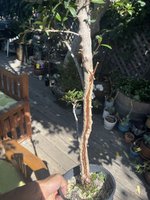goth_gardener
Seedling
Hello! I tried my hand experimenting on this very very stiff boxleaf tree I got from a local nursery, using a technique I’d seen videos of some bonsai teachers and enthusiasts doing. I hollowed out a channel on the back of the trunk to make the tree bendable, laid in copper wire, raffia wrapped, wired, and bent. There was definitely some cracking and snapping.. turns out the shell was stiffer than anticipated.. but the bark on front half is still in tact. I gave it some B1 to help with shock and fingers crossed it’ll mend and live. Thoughts? Predictions? Advice? 









